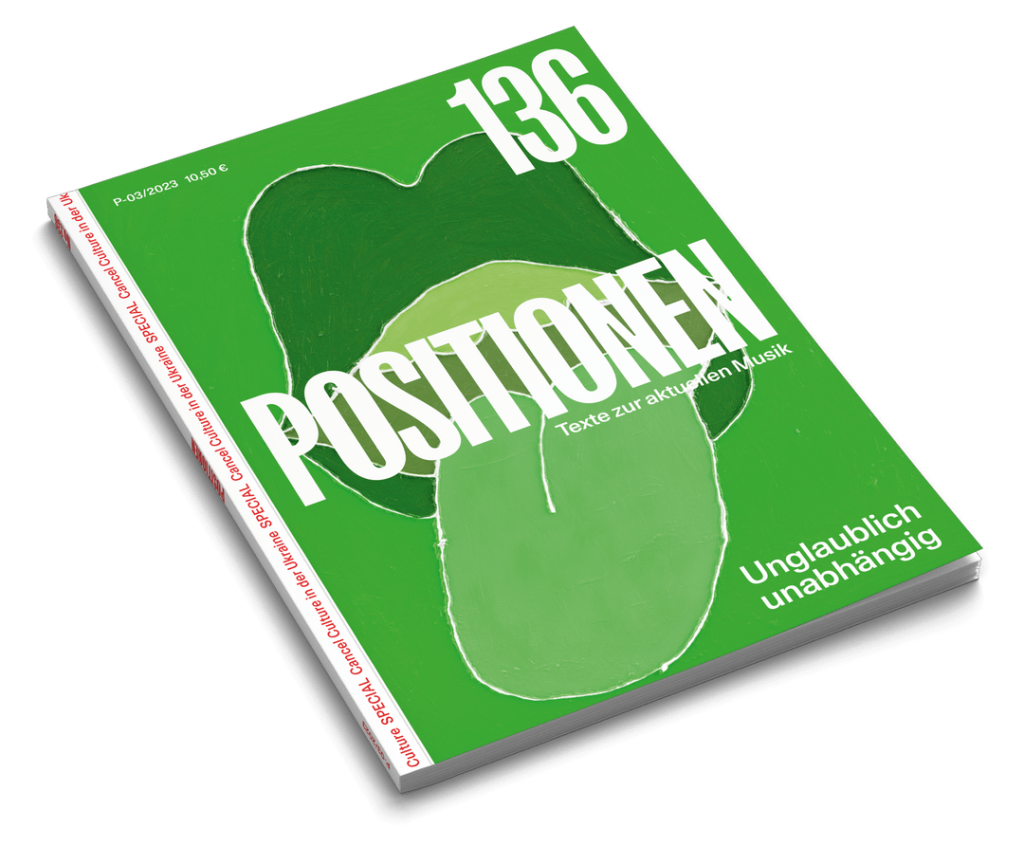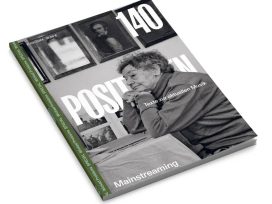Our enemy is not Tchaikovsky himself
Many Ukrainian musicians and institutions are boycotting the work of Russian composers, from the classical canon to contemporary pieces. While controversial, extracting scores, often long embedded in honed repertoires, is a deliberate post-colonial act, creating new openings and fresh interpretations on the Ukrainian music scene, at home and abroad.
At the same time, the website The Claquers published an open letter by Olena Korchova, a professor at the Ukrainian National Tchaikovsky Academy of Music. She stressed that:
in the cultural world, and indeed in the world in general, we are recognized and identified with Tchaikovsky, and this means that we are perceived as a part (or at least a small part, particle or fraction) of ‘Great Russian Culture’. We are also seen as the younger sister of our ‘great’ namesake, the Moscow Conservatory. However, our enemy is not Tchaikovsky himself, but only his simulacrum, that Soviet and Putinist ideological brand of the same name, with which they have literally tied our hands, robbed us of our freedom and made us hostages of a dead tradition. The academy cannot continue to function with this brand, and in conditions of war this is unacceptable and even immoral.
The inclusion of Tchaikovsky’s name in the title of the Kyiv Music Academy has been and remains the main impediment to the cancellation of Russian culture in the sphere of Ukrainian music. This problem seems obvious to all those who stayed in Ukraine during the war, to the Ukrainian diaspora and to all observers. However, because Russian colonialism is trying to impose a ‘common culture’ on Ukraine and to turn an independent state into a ‘single region’ of Russia (it does not see Ukraine as ‘other’ but as ‘the same’), removing Tchaikovsky’s name from the title of the main Ukrainian conservatory is an issue of national security. Despite student protests and dismissals of professors, this situation has not changed.
Finally, there is another factor at work: the business interests of the conservatory’s administration and other interested parties in the Ukrainian political system. This includes the Chinese school with which it is partnered and the financial income from Chinese undergraduate and postgraduate students. It is this economic factor that makes the leadership of the Music Academy ‘deaf’ to any arguments in favour of changing the name. It convinces the staff of the educational institute that if there is no Tchaikovsky in the title, there will be no Chinese money, which means no budget for their salaries.
So, despite the recommendations of the Ministry of Culture and a media campaign lobbying for a change of name, the general assembly of the staff of the National Music Academy of Ukraine voted against any change that might upset the Chinese sponsors. Shortly afterwards, an open letter signed by a number of high-ranking Ukrainian officials and senior representatives of the academic establishment declared that Tchaikovsky was ‘genetically’ a Ukrainian composer and that Ukraine should ‘reclaim’ his creative legacy from Russia. (Tchaikovsky does indeed have Ukrainian roots, although he had a distinctively Russian imperial worldview.)
More space for Ukrainian culture
We can insist as much as we like that ‘there is a place for everyone’, but the reality is that both human and financial resources have their limits. At the start of the full-scale war, the National Philharmonic of Ukraine demonstrated this by radically changing its repertoire, despite the difficulties this caused for long-term planning. While the refusal of foreign soloists to give concerts in a city under regular rocket attacks gave many Ukrainian artists the chance to perform on the main musical stage of the state, the removal of all Russian composers from the repertoire, without exception, as a deliberate ‘quarantine’ measure, shook the foundations of the conservative Philharmonic.
It also opened the way for fresh and daring programmes of Ukrainian music to take to the stage of the Mykola Lysenko Column Hall. Many of the wartime programmes featured western European classical music alongside new symphonic works by Ukrainian composers written after the outbreak of full-scale war. At the opening of the 159th season on 2 September 2022, the Symphony Orchestra of the National Philharmonic, conducted by Mykola Diadiura, performed Beethoven’s Eroica Symphony and Svyatyi Bozhe (Holy God), a kind of symphonic prayer by Oleksandr Rodin.
Shortly afterwards, another Kyiv orchestra, the National Symphony conducted by Volodymyr Sirenko, linked a performance of Jan Sibelius’s Second Symphony with the Ukrainian premiere of the symphonic piece ‘Bucha: Lacrimosa’ by Victoria Vita Poleva. A programme of works by contemporary female Ukrainian composers ‘Chorne Namysto’ (Black Necklace) was presented by the Kyiv Chamber Orchestra, conducted by Natalia Ponomarchuk. The Philharmonic Orchestra, directed by the guest conductor Mikheil Menabde, then gave the world premiere of the symphonic miniature ‘Kvarty’ (Quartas) by the renowned Ukrainian modernist Borys Liatoshynsky. Several significant performances of Baroque music took place, including Claudio Monteverdi’s ‘Vespers’, performed by the Borys Liatoshynsky Ensemble (conducted by choirmaster Natalia Khmilevska) in collaboration with the Orchestra Cremona Antiqua (Italy), conducted by Antonio Greco.
Cancelling as conscious self-limitation
The ranks of those who resigned from the Kyiv Music Academy in protest at the beginning of the year included Alla Zahaikevych, a composer who could be called the face of Ukrainian electronic music. Zahaikevych founded an electro-acoustic music studio at the conservatory, which has provided a base for several generations of composers. She is also the curator of numerous international projects in the field of electro-acoustic music (including Elektroakustyka and EM-Vizia) and heads the Ukrainian section of the International Association of Electro-Acoustic Music. The premiere of her first major opera ‘Vyshyvanyi: Korol Ukraini’ (The King of Ukraine) with a libretto by Serhiy Zhadan was premiered in Kharkiv in October 2021 and was a great success.
Alla Zahaikevych, commenting on the cancellation of Russian music, noted that:
in principle, electroacoustic projects in our country have little to do with Russians. I can only remember a performance with a theremin in 2005 and another project in 2007 with a Russian studying in America. So, as a rule, we almost never worked with Russians. Since 2014, we have had a certain conflict with the International Confederation of Electroacoustic Music (CIME/ICEM), of which we are a member. The Confederation unfortunately took part in the Moscow Musicological Congress commemorating the 100th anniversary of the October Revolution in 2017. We, of course, refused to participate. The members of the CIME/ICEM Council are currently attending concerts in Moscow and St Petersburg and are not responding to our demands to cease cooperation with Russia. They explain their actions by saying that they want to support their Russian colleagues who are going through a very difficult time. My position is a complete refusal to cooperate with all Russians, even those who have lived outside Russia in two or three other countries for twenty years. That is why I was extremely saddened by the reaction of Leonid Hrabovsky, who recently took part in a festival organized by Russians: ‘I have never received such attention from Ukrainians’. It hurts.
Karmella Tsepkolenko, a composer from Odesa, works in various musical genres and teaches composition at the Odesa Music Academy. She is best known, however, as the founder and artistic director of the ‘Dva dni i dvi nochi novoi muzyky’ (Two Days and Two Nights of New Music) festival, with its exceptionally interesting format and programmes. When asked about the possibility of collaborating with Russian composers or performers, Karmella Tsepkolenko replied with extreme clarity:
during the war, Russian culture becomes, in one way or another, the personification of the enemy. The performance of music by Russian composers at the ‘Two Days and Two Nights of New Music’ festival is therefore excluded. I forbid Russian artists to play my music, no matter where they live. I also forbid foreign performers to include my works in their programmes if Russian music is also played. The war unleashed by the Russian Federation took us and Russian culture to different poles. The war showed how the hatred of everything Ukrainian took a distorted form in the mass of Russian culture. In fact, hatred of everything Ukrainian seized all levels of society there, and especially the intelligentsia: people from the arts, scientists, artists, priests. This is a war between two nations, Ukrainians and Russians, a war between two historically formed communities of people, their collective bodies and collective souls.
Since the war began, Ukrainian society has rejected everything related to the enemy, its language and culture. This alienation is growing day by day: during the brutal bombardments, during the terrorist acts of the Russian army, during the marauding, looting and violence, during the increasing nuclear threat from the Russians. As a Ukrainian composer, I am a part of the Ukrainian people and I obey all the laws of war – I reject everything that belongs to the enemy culture. All my previous relations with Russian friends, colleagues and relatives disappeared, evaporated with the beginning of the war. The only exceptions are those among them who condemn the war and Putin’s regime.
The European context of the Russian problem
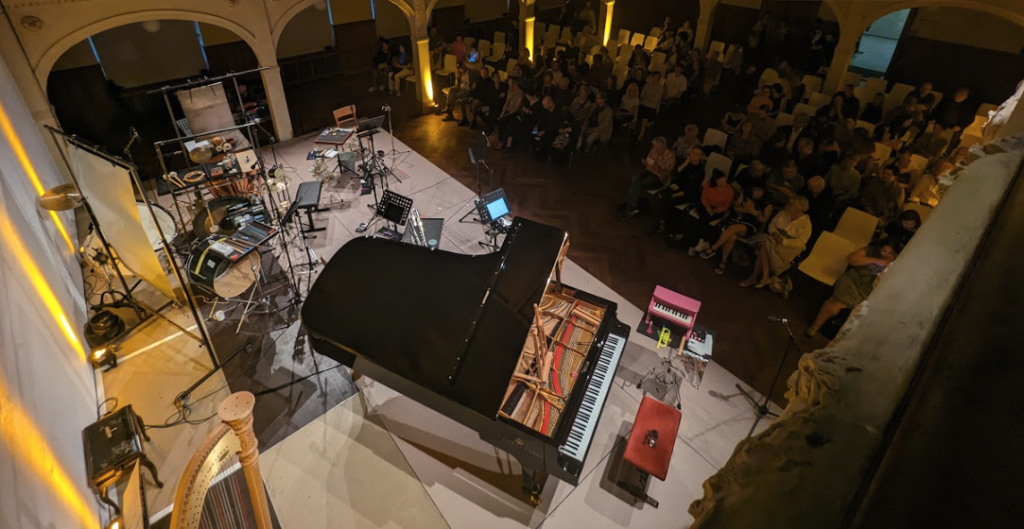
Kyiv Contemporary Music Days, Berlin, 2023. Image via Facebook
Many Ukrainian musicians have left for the West since the full-scale invasion began. Thanks to them, Ukrainian music has become more prominent and recognized abroad. The most prestigious music institutions and music collectives have extensive programmes of Ukrainian music. However, even against this backdrop, the activity of Kyiv Contemporary Music Days (KCMD) still seems exceptional in its significance and scope. In December 2022, KCMD published a statement ‘On the Role of Culture in Wartime’. As I write this text, the festival Kyiv Contemporary Music Days in Berlin is being held, comprising a series of concerts within the framework of which Ukrainian artists collaborate with German ensembles.
Asked how western audiences and western music institutions view the cancellation of Russian culture as a means of resisting Russian propaganda, KCMD’s project manager Les Vynogradov replies:
The core problem, as I see it, is that most institutions in the West are still not ready to accept Ukrainians as equals. Russians tend to be treated as expert voices, capable of producing complex narratives, whereas Ukrainians are normally reduced to the role of victims with not much else to offer. Hence, so many music institutions in Europe find it appropriate to play Russian music even when they want to support Ukraine – simply because Russian music is part of an undisputed canon. For the same reason, when a major western institution wants to perform a Ukrainian piece, they may not care so much about its artistic quality – it is included in the programme simply as a token of support, and some organizers have no idea whether Ukraine has ever produced anything of quality (and they don’t care enough to do research).
He continues:
Because of this epistemic injustice, Russian voices always have more weight in the western discourse than Ukrainian ones. And it doesn’t really matter if these voices are anti-Putin or not. That is why we believe that Russians who really care about Ukraine should step back and give their platforms to Ukrainian voices, at least until the war is over. For the same reason, after 24 February 2022, we have chosen not to collaborate with Russian musicians because no matter how well-intentioned, they will draw attention away from Ukrainians who have been invisible for decades, and that invisibility has cost us many lives. We also chose not to play Russian music because the canon must be constantly questioned for lesser-known cultures without imperial pasts to be included in the conversation.
The Kyiv Gulfstream Festival, which took place this spring after a three-year break due to COVID-19 and the war, is one of the most interesting and informal initiatives in the Ukrainian classical music sphere. It is the authorial festival of cellist and composer Zoltan Almashi, who usually invites his closest colleagues and friends to participate in the event and formulates the programme on the basis of the music he loves. The festival concerts are normally held in the premises of the National Union of Composers of Ukraine and usually attract a full house.
When asked if his attitude towards Russian music and possible cooperation with Russian composers has changed, Zoltan tries to cover all the complicated aspects of this issue:
Yes, Russian music used to be performed at the Gulfstream. This happened mainly at the first concerts in 2013. The composers involved were Sergej Newski, Dmitri Kourliandski and those who interacted on the then popular resource classic-online.ru. Russian composers were performed sporadically even after 2014. The Russian classics were also played, with Tchaikovsky being played quite often. So the overall situation was: there was a taboo on performing our music in Russia, and even more on touring there, but Russian music was still being played here. The taboo on Russian music became total after the full-scale invasion. We do not even play the music of those Russians who sympathize with us and see the situation properly. I think that the taboo on Russian music and Russian artists at Gulfstream is permanent, that is my principled position.
As for a global ban on Russian music, I see the situation as follows: the most famous Ukrainian musicians living abroad occasionally perform Russian classics. However, I am very far from the view that they should be harshly condemned, and I will explain why. The more prominent a musician is, the less freedom they have. They are very dependent on their impresarios and contractual obligations. Moreover, Western impresarios are not ready to give up Russian classics, because, let us be honest, many real masterpieces have been created that are appreciated by the public. The personality of the composer is also important. It is worth remembering, for example, that the ancestors of the modern orcs soiled the piano for the exiled and emigrated Rachmaninoff.
But it is quite another matter when Ukrainian composers and performers take part in ‘concerts for peace’ together with contemporary Russians with an extremely bad reputation. In my opinion, such things deserve to be strongly condemned. For example, the participation of the composers Victoria Vita Poleva and Alexander Shchetynsky in the same concert as the aggressive Ukrainophobe Anton Safronov.
Therefore, personally, I am in favour of a strict and total cancellation, but I insist that as far as our colleagues are concerned, their situation should be considered individually.
All the musicians I solicited gave comprehensive answers to difficult questions. This proves that no one is indifferent to the issue of the abolition of Russian culture in Ukraine and forces us to reflect on those post-colonial phenomena that seemed natural until the beginning of the Russo-Ukrainian war.
Homework
While recognizing the specific, political nature of the cancellation of Russian music and musicians in Ukraine, observers describe it as a modern form of boycott that will not be permanent. It is obvious that this boycott has become a legitimate reaction of Ukrainian society to the omnipresence of Russian missiles, mass murders and destruction of Ukrainian cultural heritage. All this has led Ukrainian society to a precise understanding of modern Russia as an imperialist state and modern Ukrainian-Russian relations as post-colonial.
Ukraine perceived the cancellation of Russian culture as a fact, a law of war, along with the blocking of Russian internet resources, the prohibition of using Russian social networks or emails with Russian domains. However, Ukraine’s attempts to communicate its demands to other countries to stop cooperating with Russian state institutions, or at least to revise the narratives of ‘Great Russian Culture’ and its ‘apolitical’ nature, have been less successful. It is already difficult to speak of real, in-depth discussions on rethinking the Russian cultural heritage in Ukraine, because at the moment the power to sustain them is simply lacking.
Of course, at some point we will have to answer the question of what to do with Igor Stravinsky, Sergei Rachmaninoff and other Russian emigrants. Similarly, we will have to consider in what format it will be possible to work with modern Russian composers such as Sergey Newski, Dmitri Kourliandski, Sergey Khismatov and others who moved to the West in 2022 or earlier, who condemned Russian aggression and who were important participants in the alternative Ukrainian music scene in the 2000s. Also, what can we ask of famous Ukrainian musicians who work in the West and popularize Ukrainian music, but who are not ready to completely give up performing Russian classics or taking part in projects alongside Russians? These are probably the most important questions from a list that could be continued here.
However, Ukraine must expand its own cultural field, work on it constantly and persistently, confidently asserting its own agency. The cancellation of Russian culture will not be permanent, and if Ukraine does not develop its own culture and set the rules for it, it will be taken over by someone else.
Published 30 October 2023
Original in German
Translated by
Steve Komarnyckyj, Voxeurop
First published by Positionen, 136 (German version); Eurozine (English version)
Contributed by Positionen © Iuliia Bentia / Positionen / Eurozine
PDF/PRINTPublished in
In collaboration with
In focal points
Newsletter
Subscribe to know what’s worth thinking about.
Related Articles
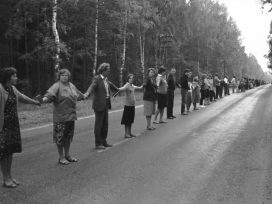
The fall of the Berlin Wall, and not the human chain across the Baltics, is emblematic of 1989. But what if this show of unity had become iconic of communism’s disintegration? Could acknowledging Eastern Europe’s liberation positively reframe what Russia otherwise perceives as loss since the Soviet Union’s demise?
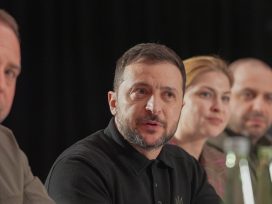
The ‘Trump–Putin deal’ again places Ukrainians in a subaltern role. The leaked contract with its fantasy $500 billion ‘payback’ has been compared to Versailles, but the US betrayal recalls nothing so much as Molotov–Ribbentrop.
